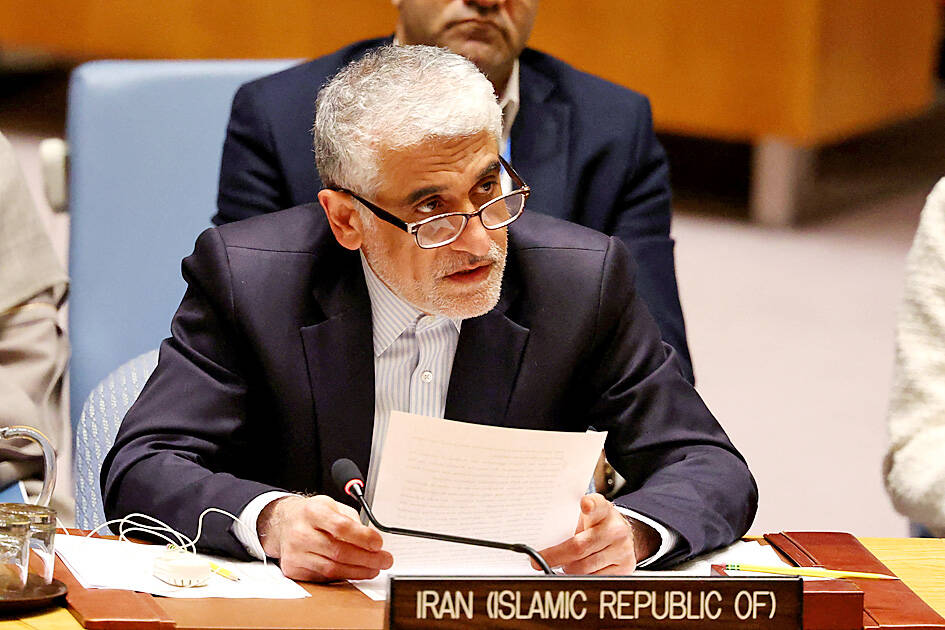Iranian Ambassador to the UN Amir Saeid Iravani on Sunday said that the Islamic Republic’s nuclear enrichment “will never stop” because it is permitted for “peaceful energy” purposes under the treaty on the non-proliferation of nuclear weapons.
“The enrichment is our right, an inalienable right, and we want to implement this right,” Iravani told CBS News.
The Iranian UN envoy also said that there are no threats from his government to the safety of International Atomic Energy Agency (IAEA) Director-General Rafael Grossi or against the agency’s inspectors, who some Iranian officials said helped Israel justify its attacks.

Photo: Reuters
IAEA inspectors are currently in Iran, but do not have access to Iran’s nuclear facilities.
The inspectors “are in safe conditions, but the activity has been suspended. They cannot have access to our site ... our assessment is that they have not done their jobs,” he said.
Iravani also responded to questions on why Tehran has not accepted proposals for a diplomatic solution. Referring to US President Donald Trump’s “unconditional surrender” demand, Irvani said the US “is dictating the policy towards us. If they are ready for negotiation, they will find us ready for that, but if they want to dictate us, it is impossible for any negotiation with them.”
Iravani on Saturday said that Iran could transfer its stocks of enriched uranium to another country in the event of an agreement with the US on Tehran’s nuclear program, Middle East news Web site Al-Monitor said.
The transfer of 20 percent and 60 percent enriched uranium would not be a red line for Tehran, Iravani said, adding that the material could alternatively remain in Iran under IAEA supervision.
However, he said that Iran would not renounce its right to domestic uranium production, a condition the US rejects.
Irvani’s comments comes as Western nations, including the US, are pushing for Iran to resume negotiations over its nuclear program a week after the US launched strikes on three facilities, setting off days of heated dispute over whether the facilities has been “totally obliterated,” as Trump initially said, or if they had delayed, but not destroyed the program.
Also speaking to CBS News on Sunday, Grossi stated that there is “agreement in describing this as a very serious level of damage,” but Iran would be able to begin producing enriched uranium within months.
“They can have, you know, in a matter of months, I would say, a few cascades of centrifuges spinning and producing enriched uranium, or less than that, but as I said, frankly speaking, one cannot claim that everything has disappeared and there is nothing there,” he added.

IDENTITY: A sex extortion scandal involving Thai monks has deeply shaken public trust in the clergy, with 11 monks implicated in financial misconduct Reverence for the saffron-robed Buddhist monkhood is deeply woven into Thai society, but a sex extortion scandal has besmirched the clergy and left the devout questioning their faith. Thai police this week arrested a woman accused of bedding at least 11 monks in breach of their vows of celibacy, before blackmailing them with thousands of secretly taken photos of their trysts. The monks are said to have paid nearly US$12 million, funneled out of their monasteries, funded by donations from laypeople hoping to increase their merit and prospects for reincarnation. The scandal provoked outrage over hypocrisy in the monkhood, concern that their status

The United States Federal Communications Commission said on Wednesday it plans to adopt rules to bar companies from connecting undersea submarine communication cables to the US that include Chinese technology or equipment. “We have seen submarine cable infrastructure threatened in recent years by foreign adversaries, like China,” FCC Chair Brendan Carr said in a statement. “We are therefore taking action here to guard our submarine cables against foreign adversary ownership, and access as well as cyber and physical threats.” The United States has for years expressed concerns about China’s role in handling network traffic and the potential for espionage. The U.S. has

A disillusioned Japanese electorate feeling the economic pinch goes to the polls today, as a right-wing party promoting a “Japanese first” agenda gains popularity, with fears over foreigners becoming a major election issue. Birthed on YouTube during the COVID-19 pandemic, spreading conspiracy theories about vaccinations and a cabal of global elites, the Sanseito Party has widened its appeal ahead of today’s upper house vote — railing against immigration and dragging rhetoric that was once confined to Japan’s political fringes into the mainstream. Polls show the party might only secure 10 to 15 of the 125 seats up for grabs, but it is

The US Department of Education on Tuesday said it opened a foreign funding investigation into the University of Michigan (UM) while alleging it found “inaccurate and incomplete disclosures” in a review of the university’s foreign reports, after two Chinese scientists linked to the school were separately charged with smuggling biological materials into the US. As part of the investigation, the department asked the university to share, within 30 days, tax records related to foreign funding, a list of foreign gifts, grants and contracts with any foreign source, and other documents, the department said in a statement and in a letter to